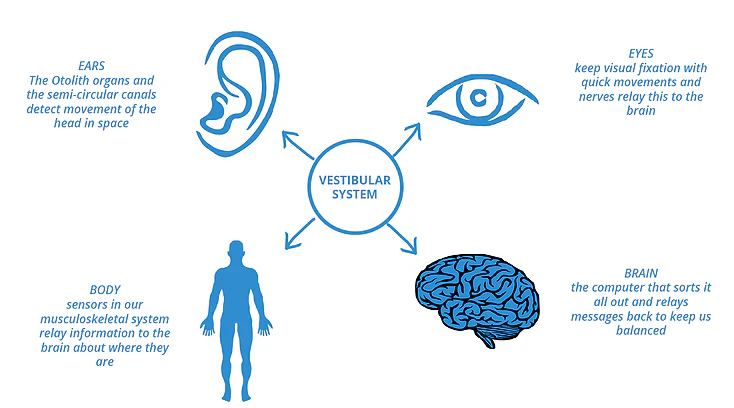5 Habits to Help vertigo and dizziness: A guide towards relief
Vertigo and dizziness can be disorienting, isolating, frustrating, and challenging to navigate. Learn how to help vertigo and dizziness in daily habits. In this article you’ll find information on daily habits that can assist in management of dizziness, and strategies that are discussed in detail with subscription to Vestibular Group Fit. There will be some discussion on other routes to compliment these habits but this list is not exhaustive. This list is designed to show common habits that have helped others, and can be relatively low cost or free to instill, with no prescription from a doctor needed.
5 Habits to help vertigo and dizziness
- Hydration. Many many people are not properly hydrated. Ensuring proper hydration is a daily habit that can better support the body and vestibular system. Many find adding electrolytes to help their hydration has assisted with brain fog, dizziness, energy etc. Talk to your doctor before adding electrolytes to your diet
- Stress and Mindset Management. One of the largest contributors to migraine attacks is stress (the other poor sleep we’ll talk about later). Stress can act like gasoline on the smallest of embers to really light up a fire. Being able to have coping mechanisms to address stress, as well as tools to modify or adjust stressors that are within control is important for overall quality of life as well as vestibular, vertigo and dizziness management.
- Nutrition. Sometimes diet changes such as limiting alcohol or caffeine intake can be helpful. This can also help anxiety and sleep quality. Adding healthy fruits and vegetables to have a well balanced diet to include protein, carbs and fats is helpful for stabilizing blood sugar and can help with overall health but also dizziness. Protein and well balanced meals and snacks have helped others reduce or eliminate later afternoon crashes, middle of the night or morning attacks. Making dietary changes should be discussed with your doctor prior to making changes, and consider a professional nutritionist or dietician for further assist and guidance.
- Movement. The body craves movement. The vestibular system helps measure movements and the brain takes those signals to make any adjustments to stay safe. Movement helps with strengthening the connection between vestibular system and the brain. Movement helps with stress, anxiety, improved sleep, improved health, hormones and so much more. This is a pillar of Vestibular Group Fit and is important to start small and gradually progress. Slow and steady. Gentle movement such as a short walk, gentle yoga or tai chi. Beginner workouts or dance classes are all great options (and also included with modifications and considerations for vestibular conditions in Vestibular Group Fit) Discussing with your doctor before performing a new exercise program is encouraged.
- Sleep. Quality, consistent sleep helps healing and giving the brain and body the rest it needs to learn, rewire and heal. Consistent sleep wake times, even on the weekends, setting up a bedtime routine, and getting quality sleep is again, important for general health but also long term management of vertigo and dizziness.
- Switch to natural options when possible. Switching to natural cleaners, soaps and detergents can take possible irritants out of the home. Brands like Branch Basics help make this easy!

Other considerations to help vertigo and dizziness
The habits mentioned above can be great to help vertigo and dizziness. Some notice considerable change when changing habits, others notice the benefits after staying consistent for 3-4 months. Others notice this has helped support other treatments to feel their best.
Other treatments, providers, or interventions may be needed for the right resources, or to help get the body to a place where daily habits can act as a considerable part of management.
This may look like medications to help break the dizzy anxious cycle, vestibular rehab therapy to scale movements back to daily routines, vision therapy to address visual symptoms, neuro modulation devices, Botox injections, and having medications to prevent or stop attacks from starting.
This can look different to everyone as everyone’s situation and background is unique to them which is why this list is not exhaustive but mean to highlight common habits that help. More resources, information and recommendations exist in Vestibular Group Fit by both expert vestibular practitioners and other vestibular warriors with their own knowledge, experience, and support.
Living with vertigo and dizziness can be challenging, but it’s essential to remember that relief is possible. By incorporating these practical tips into your daily routine, you can better manage your symptoms and regain control over your life. Remember to consult with a healthcare professional if your symptoms persist or worsen, as they can provide personalized guidance and support on your journey toward wellness.
Disclaimer
Want to learn more about daily habits to help vertigo and dizziness as well as other vestibular tools from the experts and be a part of a supportive community to get back to your daily life? Find out more at this link: https://tvd.flywheelstaging.com/about-group/
Disclaimer:
Remember: this post is for informational purposes only and may not be the best fit for you and your personal situation. It shall not be construed as medical advice. The information and education provided here is not intended or implied to supplement or replace professional medical treatment, advice, and/or diagnosis. Always check with your own physician or medical professional before trying or implementing any information read here.
Latest articles

What are the Early Signs of a Vestibular Disorder?

How long does it take to recover from a vestibular disorder? 3 things to know




